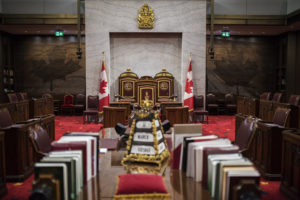A Practical First Step to Distance Ourselves from the Monarchy

Oprah Winfrey’s interview with Meghan Markle and Prince Harry has raised questions about Canada’s connection to the monarchy.
It’s a strong and deep connection that’s expressed in many ways, big and small: We have a Governor General who represents the Queen in Canada, we maintain a residence for the Queen in Ottawa, our currency bears the image of a monarch, and every so often we host a royal tour.
The Senate of Canada, which I am privileged to belong to, is likely the institution most steeped in the ritual and traditions of Westminster. The doors to the Senate chamber are opened every sitting by the Usher of the Black Rod, who carries an ebony cane as a symbol of royal authority. He’s followed by the mace-bearer, because, without the mace, the Senate cannot meet. As a senator, I must bow to the Queen every time I enter or leave the Senate chamber. Every bill passed in the Senate receives a “royal” assent.
Despite these traditions, calls to drop the Queen and the monarchy from Canada have grown louder. However, anyone who’s even the least bit pragmatic will realize that efforts to remove the monarchy will likely lead to a protracted conflict between the federal government and the provinces. The political risks would likely be too high.
So, if dropping the monarchy isn’t an option right now, what can be done to insert more Canadiana into our practices and traditions?
I would look to one of the most fundamental building blocks of Canada: the citizenship oath. I know this process well. In 1985, I took the oath of citizenship. It was a landmark day for me and my family, giving us the official enfranchisement to be Canadian in every way. But as someone who was born in post-colonial India, I couldn’t help but wonder why I was swearing my allegiance to a distant monarch. I know that many new Canadians wonder the same thing, especially those who come to this brave new world from countries that have suffered under the yoke of colonialism.
Since then, I’ve matured in my understanding of how Canada was built and how it works, and have come to appreciate our traditions and Constitution. However, I believe we should be swearing allegiance to Canada, not the Queen — or at least letting new Canadians choose to whom they swear their allegiance: the Queen or Canada.
Australia shed the sovereign from its citizenship oath in 1994, instead asking citizens to commit to Australia and its values. Sen. Philip Faulkner made the case for reinforcing the notion of an Australian citizenship. He noted that “Australian citizenship, with its attendant rights and obligations, is part of the glue which binds the nation and its citizens in a manner that gives adequate recognition to the reciprocity of that bond.”
Citizenship lies solely under federal jurisdiction. The oath can be changed simply by passing a bill through Parliament. It would require political will and leadership, but it’s within the realm of the possible.
This would demonstrate that Canada has come of age, is exerting more independence, and is ever so slightly breaking away from the troubling history of colonialism. It’s time for us to make our own traditions.